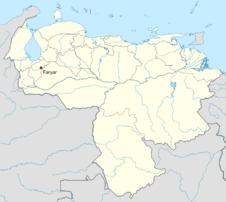Berinese Empire
Berinese Empire Imperio berinés (es) | |||||||||
|---|---|---|---|---|---|---|---|---|---|
 | |||||||||
| Capital | Bal de Or | ||||||||
| Official languages | Spanish | ||||||||
| Demonym(s) | Berinese | ||||||||
| Government | Absolute monarchy | ||||||||
| Establishment | 15 April 2012 | ||||||||
| Population | |||||||||
• Census | 7 | ||||||||
| Currency | Bolívar | ||||||||
| Time zone | VST (UTC-4:30) | ||||||||
| |||||||||
This article refers to a micronation or element of micronationalism which is defunct and no longer exists. You can help make the article reflect that or ask on the talk page for further information. |
The Berinese Empire (Spanish: Imperio berinés) or the Empire of the Great Berin (Imperio del Gran Berín) or simply Berin was a short-lived Venezuelan micronational state of the Valtir Sector with claims in the United States and Costa Rica. The term "Empire of Berin" was used to distinguish the current state with former incarnations in the same area with the same name, such as the State of Berin, the Berinese Confederation or the Republic of Berin. Berin followed a state atheism principle, but it promotes the idea of religious freedom.
History
The Declaration of Autonomy (Declaración de Autonomía), the Declaratio Independentiae was signed by Tarik Kârjasary the April 14th, declaring himself Emperor of the Beriners and Imperial Authority of the Berinese Empire. The Imperial Chart would be the latter official declaration of independence of the Empire of Berin. This micronational entity was intended to be comical and not serious, which can still be seen in many aspects of the political system of the Empire and its national identity as a whole. The process of "Seriousification" (Seriamiento) or the "straightening" (Enderezamiento) is the process employed to convert the Empire of Berin into a "serious, raw micronation". Of course, this is, among other things, part of the comical side of Berin.
The Empire quickly developed an easy-working and simple governmental system. An absolute monarchy seemed like a very useful and coherent idea based in number of population and sphere of influence of the Empire. The Imperial power turned into the most important factor in the Empire, and the Emperor was now the only important in Berin. With no legislature, no military, no foreign relations and no major event happening, Berin was an empty and lonely carcass in the micronational world. Seeking an involvement of foreign micronational powers, the Empire saw the creation of the Order of the Baphomet. The start of the Paulean era.
Government
Berinese political system is based in an absolute monarchy, centred in the Emperor of Berin (Spanish: Emperador de Berin). The Imperial power is, for those Berinese citizens, a dignified only power. The national laws are saved in the Capitulación Imperial de Leyes, the "Imperial Capitulation of Laws", used in "the right of the Berinese population in order of the Imperial power". Freedom of speech is complete, though offences against other people, Berinese citizens or not, based in race, sexual orientation or gender are banned, religious offences might be considered for ban by the Imperial authority. The Imperial family is an oligarchic power, with influences in the government. Democracy is not a disbanded concept in Berinese politics, but due to the small amount of citizens and the small participation in political activities of such, a democratic system would be impossible to work. Berinese politics are unitary, all based in the central power in the capital city and district of Bál de Or, seat of the government (the Imperial authority). Still, the American territory of Berin has a Viceroy representing the Imperial power in it. Any kinds of religious manifestations are banned from the Berinese territory, apart from speeches, any kind of religious activity can be banned.
Territorial organization
Berin is divided in prefectures, regions and Viceroyalties. In total, the Empire of Berin counts with nine divisions, six prefectures in the mainland, one region in the mainland and one region in the Pacific territory (Costa Rica) and one Viceroyalty, located in the Northern territory in the United States. There are six prefectures, which are:
- Bál de Son
- Altamar
- Débas
- Valterracota
- San Marco
- Nueva Nueva Granada
And the two regions, which are San José de Ilustres in the Pacific region and Pico de Oro in the mainland. The difference between regions and prefectures is that prefectures have no autonomy and no government of their own, while regions can have local representatives of the Imperial authority. As well, the Viceroyalty, New Altamira (Nueva Altamira) has more autonomy than regions and prefectures, since it is represented in the right of the Imperial power with a direct Viceroy.
The Imperial power
| Monarchical styles of the Emperor of Berin | |

| |
| Reference style | His Imperial Majesty |
|---|---|
| Spoken style | Your Imperial Majesty |
| Alternative style | Sire |
The Imperial Power or Imperial Authority (Spanish: Autoridad imperial) is the name used to refer directly to the Emperor of Berin and its power in the political system of Berin. The Emperor has an almost limitless power over Berinese politics and all kinds of affairs. Contrary to the system employed in many other Absolute monarchies, the Emperor or Empress regnant is not at the same time a prime minister, since there is no need for this position in Berinese politics at all, since it is a non-democratic entity that has no intentions of partisan politics and roles. In principle, the Emperor or Empress regnant of Berin is the only power that exists in Berinese political affairs. The Imperial power shall not be confused with the called Imperial Presence (Presencia imperial) that refers to any member of the Imperial family.
The Imperial family had a barely important role in Berinese politics, however, the Grand Duke or Duchess had privilege over other Imperial family members since it as the second most important member after the Emperor or Empress themselves, and receives treatments that no other member of the Imperial family are given with.
There is no law against the gender or age of the reigning Emperor or Empress. Marriage, as it is not an activity supported by the state, will not happen inside the Imperial circle. This is why Consorts, either be Empress Consort or Emperor Consort, are not a real title for anyone in Berin. Though, people who sympathize (romantically or not) with the Emperor or Empress can receive titles of other classes, usually Duke, Marquis or Count.

